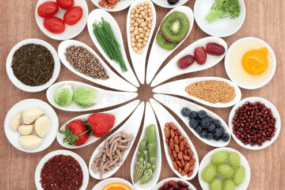
Introduction
In the world of health and wellness, diet trends and nutrition myths run rampant. With so much conflicting information, it can be challenging to distinguish fact from fiction. Many widely accepted beliefs about dieting and nutrition are not based on solid science but rather on misconceptions, marketing strategies, or outdated research. This article aims to debunk common diet myths and provide a clearer understanding of what truly matters when it comes to nutrition.
Myth 1: Carbs Are Bad for You
The Truth: Carbohydrates Are Essential for Energy
One of the most persistent diet myths is that carbohydrates are the enemy and should be avoided. While it’s true that highly processed carbs, such as white bread and sugary snacks, can lead to weight gain and health issues, complex carbohydrates found in whole grains, fruits, and vegetables are essential for a balanced diet.
Carbohydrates provide energy, support brain function, and contribute to overall well-being. Instead of eliminating carbs, focus on consuming fiber-rich, nutrient-dense sources such as brown rice, quinoa, sweet potatoes, and legumes.
Myth 2: Eating Fat Makes You Fat
The Truth: Healthy Fats Are Beneficial
For years, dietary fat was demonized as a primary cause of obesity and heart disease. However, research has shown that healthy fats—such as those found in avocados, nuts, seeds, olive oil, and fatty fish—are crucial for hormone production, brain health, and nutrient absorption.
The key is to avoid trans fats and excessive saturated fats while embracing unsaturated fats. Rather than fearing fat, opt for whole-food sources and moderation.
Myth 3: You Need to Eat Small, Frequent Meals to Boost Metabolism
The Truth: Meal Frequency Does Not Significantly Impact Metabolism
Many believe that eating every two to three hours boosts metabolism and aids in weight loss. However, studies show that meal frequency has little to no impact on metabolic rate.
What truly matters is the overall quality and quantity of food consumed throughout the day. Whether you eat three meals or six, focus on nutrient-dense foods and listen to your body’s hunger and satiety cues.
Myth 4: Detox Diets and Cleanses Remove Toxins
The Truth: Your Body Naturally Detoxifies Itself
Detox diets and juice cleanses are often marketed as ways to eliminate toxins from the body. However, the human body is equipped with a highly efficient detoxification system—primarily the liver, kidneys, and lymphatic system—that naturally removes harmful substances.
Rather than relying on expensive detox programs, support your body’s natural detoxification by staying hydrated, eating a balanced diet rich in fiber, and avoiding excessive alcohol and processed foods.
Myth 5: Eating Late at Night Causes Weight Gain
The Truth: Calories Matter More Than Timing
Many people believe that consuming food after a certain hour leads to weight gain. However, weight gain occurs when calorie intake exceeds calorie expenditure, regardless of the time of day.
What matters most is the quality and quantity of food consumed throughout the day. Eating late at night isn’t inherently bad, but unhealthy snacking or overeating in the evening can contribute to weight gain.
Myth 6: You Must Cut Out Gluten to Be Healthy
The Truth: Gluten Is Only Harmful for Those with Sensitivities
Gluten-free diets have gained popularity, leading many to believe that gluten is inherently unhealthy. However, gluten—a protein found in wheat, barley, and rye—is safe for most people.
Only individuals with celiac disease, gluten sensitivity, or wheat allergies need to avoid gluten. Whole grains that contain gluten, such as whole wheat and barley, provide valuable nutrients like fiber, vitamins, and minerals.
Myth 7: High-Protein Diets Are Harmful to Your Kidneys
The Truth: Protein Is Essential and Safe for Most People
A common myth is that consuming too much protein harms kidney function. While individuals with pre-existing kidney disease should monitor protein intake, high-protein diets are generally safe for healthy individuals.
Protein plays a crucial role in muscle repair, hormone production, and immune function. Lean protein sources like chicken, fish, beans, and tofu can be beneficial as part of a balanced diet.
Myth 8: Fresh Produce Is Always Better Than Frozen
The Truth: Frozen Fruits and Vegetables Are Just as Nutritious
Some believe that fresh produce is superior to frozen options. However, frozen fruits and vegetables are often picked at peak ripeness and flash-frozen, preserving their nutrients.
In some cases, frozen produce can even retain more nutrients than fresh items that have been stored and transported over long distances. Both fresh and frozen options can be part of a healthy diet.
Myth 9: You Should Avoid All Processed Foods
The Truth: Not All Processed Foods Are Bad
While highly processed foods containing excessive sugar, salt, and unhealthy fats should be limited, not all processed foods are harmful. Many nutritious options—such as yogurt, whole-grain bread, and canned beans—are technically processed but still provide essential nutrients.
Rather than avoiding all processed foods, focus on choosing minimally processed options with simple, whole-food ingredients.
Myth 10: Drinking More Water Helps You Lose Weight
The Truth: Hydration Supports Weight Loss, But It’s Not a Magic Solution
While staying hydrated is important for overall health and can aid in weight management, simply drinking more water will not directly cause weight loss. Water can help with appetite control and digestion, but weight loss ultimately depends on a combination of diet, exercise, and lifestyle habits.
Drinking water instead of sugary drinks, eating water-rich foods, and staying hydrated can support a healthy metabolism and overall well-being.
Myth 11: All Calories Are Equal
The Truth: Nutrient Quality Matters More Than Just Calories
Many diet plans focus solely on calorie counting, but not all calories have the same impact on the body. Calories from whole, nutrient-dense foods provide essential vitamins, minerals, and fiber, while empty-calorie foods (such as soda and processed snacks) offer little nutritional value.
Rather than focusing only on calorie intake, prioritize a balanced diet rich in whole, unprocessed foods.
Myth 12: Exercise Alone Is Enough for Weight Loss
The Truth: Diet and Exercise Go Hand in Hand
While exercise is an essential component of a healthy lifestyle, weight loss primarily depends on diet. It’s easier to consume excess calories than to burn them through physical activity.
A combination of healthy eating and regular exercise is the most effective approach to weight management and overall health.
Conclusion
With so much misinformation surrounding diet and nutrition, it’s crucial to separate myths from reality. Many popular diet beliefs are based on outdated science or marketing tactics rather than solid evidence. Instead of following fads, focus on a well-balanced, nutrient-rich diet, listen to your body, and adopt sustainable habits for long-term health.
By understanding the truth about nutrition, you can make informed decisions and develop a diet that supports your well-being without unnecessary restrictions or fears.























